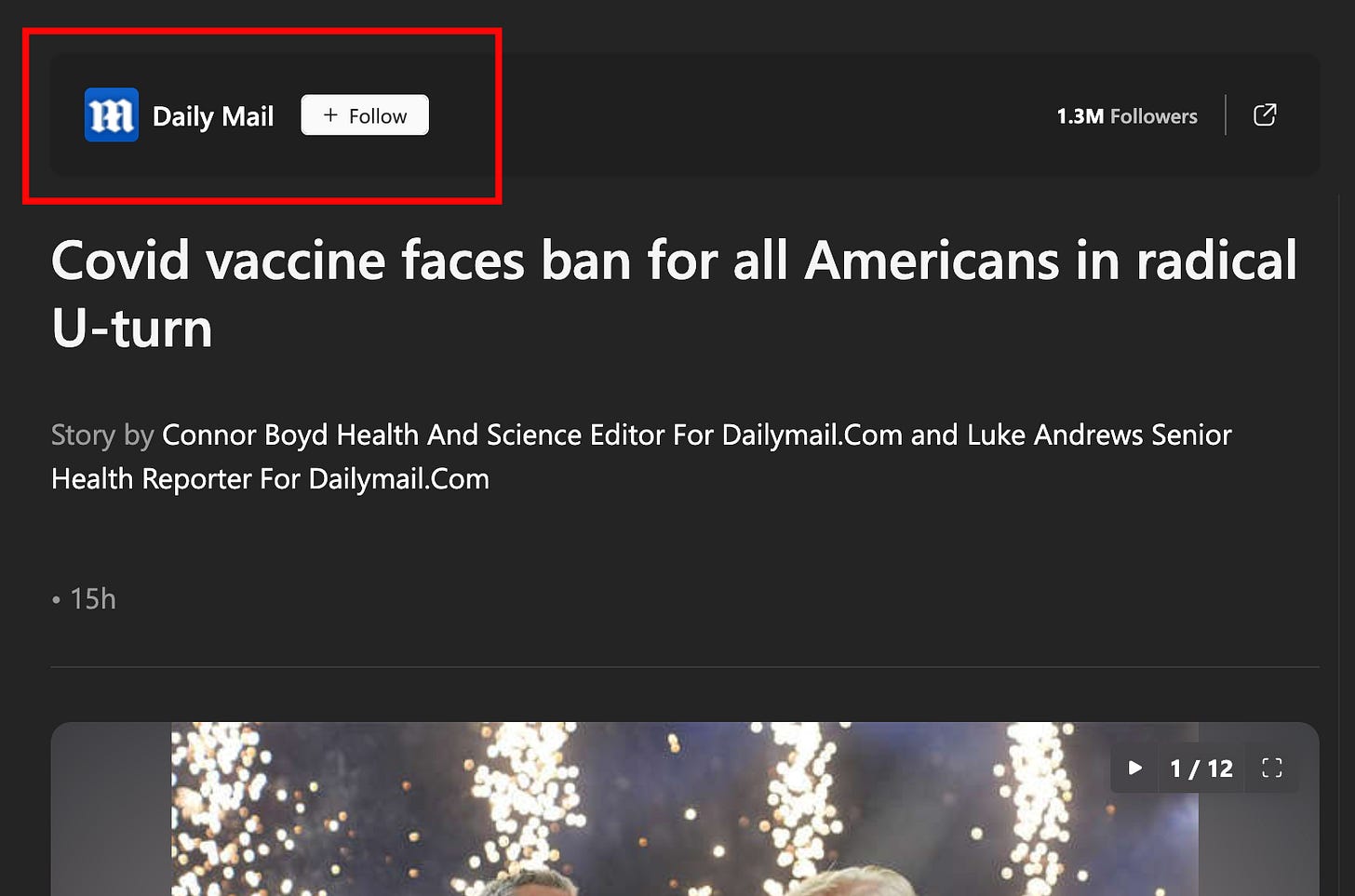Active vs. Passive Information Gathering: How to figure out what's real in a world of propaganda
If we don't know what's real, we can't resist. - The Matrix Resurrections (2021)

It’s an important and popular fact that things are not always what they seem. Between traditional and social media, the United States is awash with propaganda. Many people aren’t even aware of it and automatically trust everything they read or hear, which makes them vulnerable to manipulation. It’s not efficient for me to spend all my time fact-checking stuff on the Internet. I’d rather teach you how to do it for yourself.
But first, I really must emphasize that if you think you are not vulnerable to falling for propaganda, it is exactly that belief that makes you vulnerable.
Confirmation bias and social media
Confirmation bias is a known psychological principle. In essence, your brain is hard-wired to accept information that supports what you already believe and reject information that challenges it. Everyone does it. As long as you’re aware of this little quirk of our brains, you can work to counteract it.
Then, social media was created. This made a lot of people very angry and is widely regarded as a bad move. Don’t get me wrong, I love my socials. I have made real, lifelong friends who I met through social media. Movements have been organized with social media. It has changed the world.
But it’s also changed our brains. The algorithms of pretty much every social media platform are built to reinforce confirmation bias. You get more of what you interact with. If you only interact with content about puppies, you get more puppies. If you only like stuff from Fox News, you get more Fox News. If you only like articles from MSNBC, you get more MSNBC. You see, social media feeds into your already existing tendency to only accept information that you agree with.
Scrolling social media is passive information gathering. And it really isn’t the best way to ascertain what’s really going on. It’s a great way to meet other people who think like you. But, you know, they could be wrong about some stuff.
I can’t give up my social media either, so here are some things you can do to counteract the confirmation bias effect:
Follow people who know more than you do!
Follow people who are experts in their field. The only reason I know that COVID is still a thing is that I follow epidemiologists and medical doctors who have dedicated their time and energy to educating the public about it.
The same goes for any subject. Follow astrophysicists and climate change scientists. Follow artists and musicians. Follow independent journalists and lawyers. Listen to what they have to say, but keep in mind this is still passive information gathering. You still want to do your best to fact-check the things you learn.
Keep in mind that a Google search is not the same thing as years of experience in a field of study. We’ll get to how to use Google to fact-check but please understand that there is a certain nuance that comes with being an expert in your field that Google can’t give you.Train your algorithms
Be mindful of how the algorithms work. Everything you interact with, even if you click on it accidentally, you’re going to see more of. It cracks me up when I see someone talk about how TikTok is just a bunch of dancing teenagers. Either they haven’t actually been on TikTok, or they are telling on themselves. If all you see are dancing teenagers, it’s because that’s what you’ve been interacting with.
Anyway, I try very hard to intentionally interact with content that I find useful, helpful, or uplifting. So I still get a lot of puppy videos and food videos, but I get a lot of other fun and informative stuff too.
I would challenge you to like and interact with social content from people who look different or have a different lived experience than you. You’ll be surprised how much you learn.
The greatest challenge facing mankind is the challenge of distinguishing reality from fantasy, truth from propaganda. Perceiving the truth has always been a challenge to mankind, but in the information age (or as I think of it, the disinformation age) it takes on a special urgency and importance.
-Michael Crichton
Watching the news on TV
If you get your news primarily from the television, this is also passive information gathering. There have been studies that show that when you’re sitting there absorbing information from the TV, it puts your brain into a more relaxed state when your critical thinking skills aren’t as active.
There really isn’t a lot of TV news media that isn’t biased, and if you’re passively absorbing the information, you’re probably not asking questions like:
Is this true?
What is the context for this story?
What information are they leaving out?
Does this feed into my preconceived ideas or challenge them?
Red flags for spotting propaganda
There’s so much propaganda out there, and I really must emphasize that it isn’t limited to one side of the political spectrum. If you think you’re not seeing propaganda, I’m so sorry, but you’re wrong. If it doesn’t register as propaganda, then you’ve been accepting it as truth.
Here are a few red flags to look out for:
🚩 Triggers a strong emotion, usually panic
I haven’t gotten around to writing about phishing emails yet, but triggering a strong emotion is the same manipulative tactic used to get you to click on a link in an email. If you’re panicked, then your higher-level thinking isn’t engaged.
In this case, rather than trying to get you to click on a link, they’re trying to get you to share it without fact-checking.
🚩 Lack of nuance
“Only Siths deal in absolutes.” - Obi-Wan Kenobi
There is almost always more nuance available on any subject. But if you see something that seems overly simplified, it is likely to be propaganda. Beware of “black and white” thinking.
If you see an especially short video clip, for example, ask yourself what the context for that was. They’re probably intentionally leaving something out.
🚩 Simple, often three or four-word phrases
“Build the wall.” “Lock her up.” “Make America Great Again.”
The more simple it is, the more likely it is to be propaganda. Especially if it is repeated ad nauseam, the more times it is repeated, the more likely your brain is to accept it as reality.
🚩 Divisive rhetoric, or “othering” a particular group
Anything that attempts to dehumanize a specific group of people is most likely propaganda. It seems weird to have to explain this, but all humans are human.
That’s not to say that certain individuals aren’t genuinely scary and evil, but if you see something that tries to paint an entire group in a negative light, you need to question that. (And because only Siths deal in absolutes, the exception to that rule is Nazis. Nazis are always bad.)
This applies to demographic groups but also the whole left vs. right thing. I know people on the right who genuinely think that everyone on the left is a brainwashed “woke” hippie drug addict. (Don’t get me started on how we’ve already dehumanized people with an addiction.) Similarly, many on the left think people who voted for Trump are brain-dead, inbred yokels who couldn’t be trusted to wipe their own ass.
None of these preconceived notions are true. What you’re seeing on social media is likely the extreme ends of the political spectrum. Please just talk to people who disagree with you and start to see them as real people again.
"We can and must write in a language which sows among the masses hate, revulsion, and scorn toward those who disagree with us." ~ Vladimir Lenin
Fact-checking tips and tricks
For all we know, this is a simulation where the mice are experimenting on us, and nothing is real. But for the sake of argument, let’s say there is such a thing as objective reality. The best way to figure out what that is would be active information gathering. Go looking for the answers yourself.
My challenge to you is this: question everything you see and hear, especially things that you already agree with. You’re naturally going to want to fact-check things that you disagree with. It’s the stuff that feeds into your cognitive bias that you’ve got to watch out for.
Let’s walk through what I do to fact-check with a real-life example. I saw this post on Threads this week, from an account that I normally trust to provide pretty good information.
Note that the link provided is to msn.com, which some might consider to be a reputable source. But let’s click on it and take a look at what’s actually in the article (always a good first step).
Ru-roh. Looks like this is actually from The Daily Mail. For those who are unfamiliar, The Daily Mail is basically the UK’s version of Fox News. Very right-wing, and often posts ridiculous made-up stories.
I’m not sure how to explain which sources I find reputable and which ones I don’t, especially with as quickly as the American media has scrambled over themselves to bow down to the Trump-Musk regime. Every media outlet is going to have some bias. The really reliable ones tend to only report the facts without any commentary. You can use this media bias chart as a guide to determine if you’re getting your news from a balanced mix of sources or if it’s only from one end of the political spectrum.
You could be forgiven for thinking this was actually from the AP, which is a very reliable news source, but in reality, that is just the credit for this particular photo.
Best to double-check that this news is being reported elsewhere. For that, to the Google! (You can use whatever search engine you prefer. Just note that if you’re not using a private window and a VPN, your search history may be monitored. This is likely true of any search engine, so I still use Google.)
Pro tip: Google tends to show you primarily news results. If you’re looking for a scientific study, you’ll want to use scholar.google.com to search scientific papers.
Google search operators are your friend!
It’s not like Google can give us the answer to life, the universe, and everything, but if you know how to use search operators, it’s an incredibly powerful tool for fact-checking.
The search operator “site:” will narrow your search results to a specific site. Say you only want results from AP. Your search might look like this:That lends a few results:
The third result down is about an Idaho health department not being allowed to give the COVID-19 vaccine, but that’s actually old news. Let’s click on the top result and see what it says. We get a fact-checking article, but oops! This is from 2022.
To further narrow down your results to breaking news (notice the other top results there are from 2023 or 2024), you can use the “before:” or “after:” search operators. Note that you need to format your date as YYYY-MM-DD. Let’s try it again.
That gets us more recent results, narrowed down to the current month. But, still, nothing here about a vaccine ban.
So we can tell from this that AP News isn’t reporting on it. That doesn’t mean other news sites aren’t. We can broaden our search scope and leave off the “site:” operator. Let’s see if anyone else is reporting on it.
The top results now show the MSN site we already looked at, the original Daily Mail article, something from Instagram (not a news source), MSN again, and then the 5th result is something from PBS. Let’s check that one out.
So this article is about Trump signing an executive order that basically says schools that require vaccines might lose federal funding. That’s also ridiculous, and we can talk about that later. Apparently, you can’t be President with a whole brain.
But the first reputable source that comes up regarding a COVID-19 vaccine ban is not about a vaccine ban. (You can read the whole article here, if you’d like.)I scrolled through the rest of the search results, for a couple of pages, and all I found in reference to a ban is from Reddit (talking about the Daily Mail article), which, you guessed it, is not a reputable news source.
Maybe the information is being suppressed in the United States. It seems unlikely since the Daily Mail article was at the top of the results. But let’s check.VPN
This is where a VPN really comes in handy. I can use my VPN to get search results as if I was in another country. I use ExpressVPN. See my previous article if you’re interested in other options. Anyway, let’s “travel” to the UK.Next, I’ll go to google.co.uk and try the exact same search. (covid vaccine faces ban in US after:2025-02-01) Let’s see if the results are different.
Okay, that NPR article at the top is new (well, it was on page 2 of the search results in the US). Still an idiotic thing for the regime to do, but it’s not what we’re looking for. The only other articles are The Daily Mail and the MSN link, which is a repost of The Daily Mail article.
I would consider this one debunked. If the only source for the information is The Daily Mail and no other news sources are picking up on it, it’s most likely not true. (99.98% sure, which is as sure as I ever get about anything.)You can’t trust what ChatGPT tells you
As we discussed last time, you can’t trust what ChatGPT tells you. ChatGPT would far rather you be happy than right any day. Purely for the purposes of demonstration, though, I thought I would go ask ChatGPT what it “thinks” about this COVID-19 vaccine ban. It actually did a pretty good job… this time.
I still maintain that if you’re going to use AI, you’ve got to think, “don’t trust, and verify,” just like you’d do with anything else. ChatGPT and other forms of Generative AI have been known to make stuff up. Be wary. I do understand that this is a lot faster, but it’s not as accurate as your own brain.
Reverse Image Search
A lot of propaganda spreads through simple memes and photos. I’m picking on the left in this case, but this definitely happens on both sides of the political spectrum. I don’t really get the right-wing propaganda in my social media feeds. This is just an example to show how to fact-check pictures.
Occupy Democrats recently posted this meme:
I immediately noticed a few red flags that make me think we should fact-check this, aside from the fact that you should really just fact-check everything.
🚩 It’s written to cause panic!
🚩 Russia just got a huge win from Trump, so it really doesn’t make logical sense.
🚩 The cited source is someone named @marston1889 (A quick Google search shows that is a Twitter account that no longer exists. Sus.)
So let’s see if we can figure out where that picture came from. For that, we want to do a reverse image search. There are plenty of options where you can do that for free. I tend to use tineye.com.
If you upload the image directly as it is, with all the words, the search won’t come up with anything. So, we need to crop out all the extra stuff and see if that leads to different results.
I cropped it to look like this:
Which gives us 27 results! Let’s sort the results to show the oldest reference first and see what the original source of this picture is:
Oh no! Not the Daily Mail again! The oldest use of this graphic is coming from the Daily Mail!
I’m curious what CBS News has to say about it though, so let’s click on that first CBS link. Okay, so there’s the exact same picture we see in the meme, but if you’ll note the date, this is an article from 2019. The article appears to be pretty well-researched, so that’s good, but Occupy Democrats shared the photo as if it were breaking news. That is, at best, intentionally misleading.
So I feel reasonably confident we can also call this one debunked.
AI Images and Videos
This is already getting pretty long, so I will cover how to spot AI-generated photos and videos in another post. For now, just be aware that AI is getting a lot better than it used to be.
Think you haven’t been seeing as many AI-generated images lately? Think again.
This example is actually AI-generated. I wouldn’t have spotted it myself, honestly.
For now, what I’d like you to know is that you can use a tool like sightengine to pretty reliably figure out if an image is AI-generated. It said this one was, with a 99% confidence rate.
So I think that’s enough for today, class! Your homework assignment is to question everything, especially things you agree with, and especially if it makes you feel a sense of panic. I’ve seen an awful lot of stuff in the last few weeks that sounded absolutely alarming, but upon closer examination, turned out to be propaganda. So grab your towel, and DON’T PANIC!1
If you’re a fan of Hitchhiker’s Guide to the Galaxy, you may have noticed the references I sprinkled into this article. I don’t know why I feel the need to throw in quotes from my favorite nerdy things. I think I’m just a silly goose. Anyway, if you spotted them, well done!

























